-
Disponible en Vimeo
Un dessert pour Constance [Un postre para Constance]
Francia, 1980, color, VO en francés subtitulada en español, archivo digital, 60’
Enlace a Vimeo: Un dessert pour Constance [Un postre para Constance]
Tras su proyección íntegra (17 - 21 abril), se muestra un extracto como archivo.Inusitada comedia costumbrista sobre la vida de un grupo de migrantes africanos en París. Amable y corrosiva a partes iguales, dos barrenderos africanos encuentran un recetario clásico de cocina francesa, que estudian como divertimento hasta convertirse en verdaderos expertos, ganando el primer premio en un programa de televisión típico de la clase media francesa.
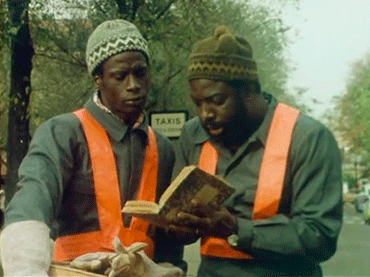
-
Disponible en Vimeo
Miró, peintre [Miró, pintor]
Francia, 1980, color, VO en francés y catalán subtitulada en español, archivo digital, 5’20’’. Película inédita
Enlace a Vimeo: Miró, peintre [Miró, pintor]
Tras su proyección íntegra (17 - 21 abril), se muestra un extracto como archivo.Breve pieza para la serie de televisión Aujourd'hui en France [Hoy en Francia]. La reseña de una exposición de Miró en la Fundación Maeght ofrece la oportunidad de aproximarse al artista surrealista desde los temas centrales de la cineasta: el teatro, la interrelación entre las artes y la transformación de la experiencia infantil a través del arte. El conjunto resulta como una obra de Joan Miró trasladada a la vida real. Esta es su primera proyección tras su pase en televisión en 1980.
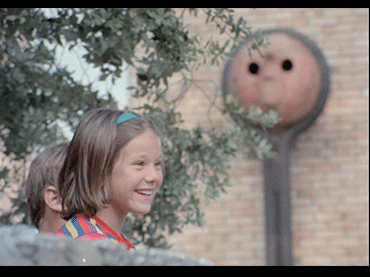
-
Disponible en Vimeo
Scala Milan AC
Francia, 2003, color, VO en francés subtitulada en español, archivo digital, 18’
Enlace a Vimeo: Scala Milan AC
Tras su proyección íntegra (17 - 21 abril), se muestra un extracto como archivo.Un grupo de jóvenes de la banlieu de Saint Denis, de distintas procedencias étnicas y geográficas, participa en un concurso escolar para contar su barrio, cuyo premio es un viaje a Milán. Con la colaboración del histórico músico de jazz Archie Shepp, configuran un himno poético a la Francia racializada e invisibilizada que se eleva sobre la marginación. La película, también producida por otra cineasta, Agnès Varda, es una colaboración en su propia factura entre la cineasta y los adolescentes.
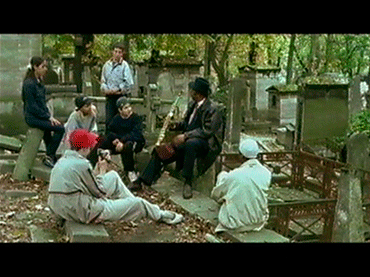
En recuerdo de Sarah Maldoror (1929-2020)
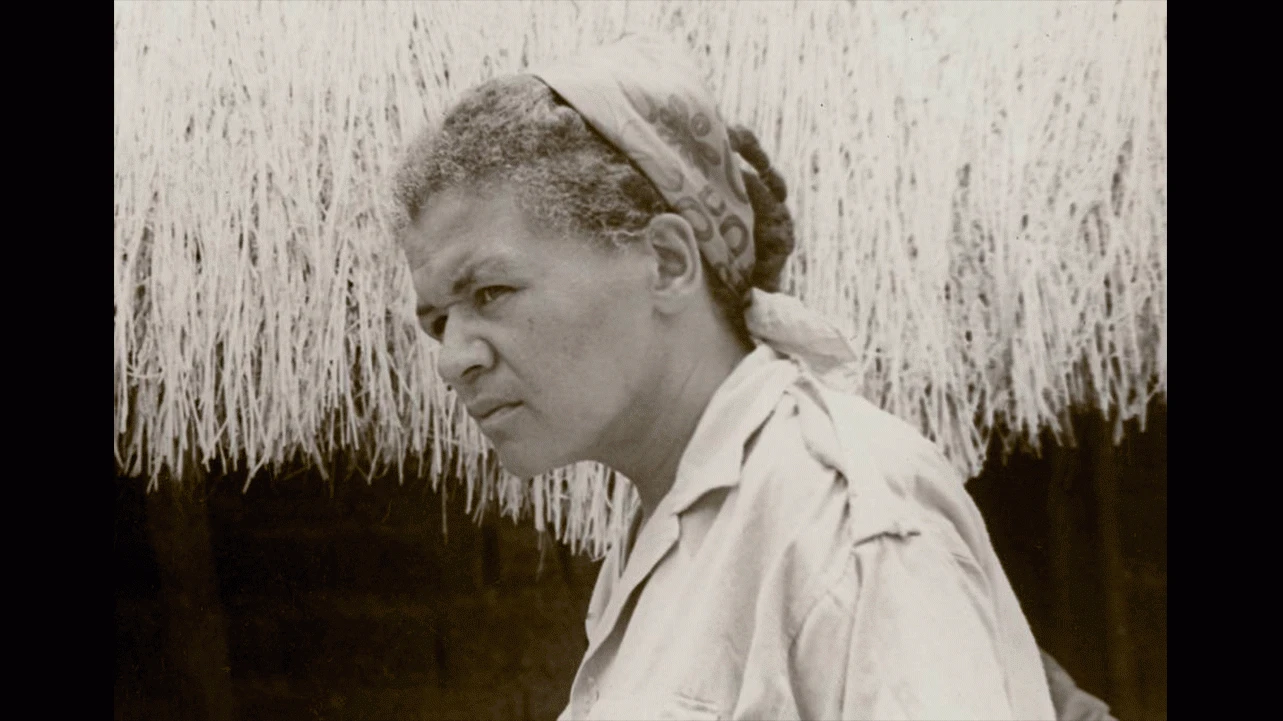
Held on 16 Apr 2020
El pasado 13 de abril fallecía por coronavirus la artista y cineasta Sarah Maldoror. Pionera del cine anticolonial y feminista, deja una amplia y original filmografía en la que el teatro y la poesía dialogan con la imagen. El Museo Reina Sofía y Documenta Madrid realizaron la primera retrospectiva internacional de esta luchadora infatigable en 2019, cuya obra está siendo recuperada desde entonces por festivales, filmotecas y centros de arte. Como homenaje a su memoria, el Museo y Cineteca Madrid ofrecen en abierto un programa con tres de sus películas: Un dessert pour Constance (1980), Miró, peintre (1980), cortometraje inédito, y Scala Milan AC (2003).
Un programa de poco más de una hora con dos cortometrajes y un mediometraje sobre la emancipación del arte y el antirracismo desde un cine popular.
Sobre Sarah Maldoror
Sarah Maldoror, nacida con el apellido Ducados de padre antillano y madre francesa, fue una cineasta clave en los movimientos de descolonización africanos de las décadas de 1960 y 1970. Más adelante su cine buscará ser la expresión poética del movimiento intelectual y artístico de la Negritud, puente entre el surrealismo de pre y posguerra. En su última etapa, desmontará las identidades esencialistas con una mirada crítica a la Francia -y Europa- contemporánea a través de un cine popular basado en la ética de la diferencia. Su visita al Museo y a la Cineteca en 2019, para presentar la retrospectiva, fue su última aparición pública.
En su educación resultan determinantes dos hechos. El primero, la fundación de Les Griots [Los trovadores] en 1956, primera compañía teatral en Francia integrada únicamente por actores africanos y afrocaribeños, precisamente para acabar con “su rol de sirvientes”, en sus propias palabras. Jean Genet y Aimée Cesaire escribirían obras para Les Griots y el pintor Wifredo Lam realizaría el cartel de su primera puesta en escena, A puerta cerrada, de Jean-Paul Sartre. El segundo hecho fue el aprendizaje del lenguaje fílmico en el VGIK, la escuela de cine de Moscú, a comienzos de 1960, junto a Ousmane Sembène, otro grande de la filmografía africana. La dimensión teatral y las cualidades de la vanguardia soviética recorrerán todo su corpus fílmico.
Tras esta formación, trabajará con Gillo Pontecorvo y William Klein en La batalla de Argel (1965) y en Festival panafricain d'Alger [Festival panafricano de Argel](1970), directores que incorporarían su mirada e ideas políticas sin el debido reconocimiento. Muy pronto daría forma a un cine propio con el cortometraje Monangambée (1969, en proyección permanente en la Colección del Museo Reina Sofía) y el largometraje Sambizanga (1972). Ambos filmes muestran, desde el punto de vista de la mujer, la violencia del colonizador hacia el colonizado a través de la tortura y del implacable sistema burocrático-policial, pero también desde un hecho si cabe más cruel, la ignorancia absoluta del colonizador hacia la cultura del otro. Ambos metrajes también se adscribirían a la vanguardia fílmica en el montaje sincopado procedente del jazz experimental y en la incorporación de aspectos documentales a la ficción narrativa.
Maldoror ampliaría este compromiso anticolonial en la internacionalización de los movimientos de liberación africanos, como prueban los documentales Fogo, l´ile de feu (1979), A Bissau, le carnaval (1980) o Un carnaval dans le Sahel (1979), en los cuales resuena el diálogo con grandes teóricos anticoloniales como Aimée Cesaire, Amílcar Cabral, Mario Pinto de Andrade, pareja de Maldoror, y Luis Cabral. La historia contada desde abajo y la mirada antropológica al paisaje y al pueblo naciente en sus expresiones espontáneas se dan la mano. Estos documentales, cercanos a la visión surrealista de lo popular, son una visión única de los futuros posibles de África.
Sarah Maldoror se ufanaría en hallar una expresión fílmica al movimiento de la negritud, protagonizado por los poetas y filósofos Léopold Sédar Senghor, Aimée Cesaire y León Damas. La expresión poética, la cultura oral y el teatro como vía para hacer presente la historia se citan en los documentales Et les chiens se taiseient, d'Aimé Césaire (1978), Aimé Césaire au bout du petit matin (1977), Léon G. Damas (1994) y Toto Bissainthe (1984). En todos ellos, Maldoror mostraría una visión cosmopolita de una identidad transnacional y compondría una valiosa galería de retratos fílmicos de los artífices del movimiento teórico, político y artístico de la Negritud.
En la última etapa, la cineasta trabajaría desde Francia en los resquicios que deja la industria para una figura incómoda a la ortodoxia social y cultural, esto es, en producciones televisivas. En estos trabajos, conjugaría lo popular y el sentido del humor para dinamitar estereotipos identitarios sobre lo francés. Así ocurre en Un dessert pour Constance (1980), Le racisme au quotidien (1984) o Scala Milan AC (2003). También contaría las paradojas de la revolución y del exilio, con ecos biográficos, a través de L’Hospital de Leningrad (1982), Le passager du Tassili (1985) y Vlady-peintre (1989). El encargo del Ministerio de Exteriores francés para el programa Aujourd'hui en France, le permitiría componer una inusitada galería de artistas y protagonistas culturales filtrada por su original mirada de extranjera en su propia tierra, como Emanuel Ungaro, Joan Miró, Alberto Carliski o Robert Lapoujade, muchos de los cuales están aún pendientes de redescubrir. Convocamos la voz de Aimé Cesaire como línea final: “A Sarah Maldo.../quien/cámara en mano/lucha contra la opresión, la alienación/y desafía/la canalla humana.”
Organised by
Museo Reina Sofía, Cineteca Madrid y Documenta Madrid
Más actividades
![Tracey Rose, The Black Sun Black Star and Moon [La luna estrella negro y negro sol], 2014.](https://recursos.museoreinasofia.es/styles/small_landscape/public/Obra/AD07091_2.jpg.webp)
On Black Study: Towards a Black Poethics of Contamination
Monday 27, Tuesday 28 and Wednesday 29 of April, 2026 – 16:00 h
The seminar On Black Study: Towards a Black Poethics of Contamination proposes Black Study as a critical and methodological practice that has emerged in and against racial capitalism, colonial modernity and institutional capture. Framed through what the invited researcher and practitioner Ishy Pryce-Parchment terms a Black poethics of contamination, the seminar considers what it might mean to think Blackness (and therefore Black Study) as contagious, diffuse and spreadable matter. To do so, it enacts a constellation of diasporic methodologies and black aesthetic practices that harbor “contamination” -ideas that travel through texts, geographies, bodies and histories- as a method and as a condition.
If Blackness enters Western modernity from the position of the Middle Passage and its afterlives, it also names a condition from which alternative modes of being, knowing and relating are continually forged. From within this errant boundarylessness, Black creative-intellectual practice unfolds as what might be called a history of touches: transmissions, residues and socialities that unsettle the fantasy of pure or self-contained knowledge.
Situated within Black radical aesthetics, Black feminist theory and diasporic poetics, the seminar traces a genealogy of Black Study not as an object of analysis but as methodological propositions that continue to shape contemporary aesthetic and political life. Against mastery as the horizon of study, the group shifts attention from what we know to how we know. It foregrounds creative Black methodological practices—fahima ife’s anindex (via Fred Moten), Katherine McKittrick’s expansive use of the footnote, citation as relational and loving labour, the aesthetics of Black miscellanea, and Christina Sharpe’s practices of annotation—as procedures that disorganise dominant regimes of knowledge. In this sense, Black Study is approached not as a discrete academic field but as a feel for knowing and knowledge: a constellation of insurgent practices—reading, gathering, listening, annotating, refusing, world-making—that operate both within and beyond the university.
The study sessions propose to experiment with form in order to embrace how ‘black people have always used interdisciplinary methodologies to explain, explore, and story the world.’ Through engagements with thinkers and practitioners such as Katherine McKittrick, C.L.R. James, Sylvia Wynter, Christina Sharpe, Fred Moten, Tina Campt, Hilton Als, John Akomfrah, fahima ife and Dionne Brand, we ask: What might it mean to study together, incompletely and without recourse to individuation? How might aesthetic practice function as a poethical intervention in the ongoing work of what Sylvia Wynter calls the practice of doing humanness?

Intergenerationality
Thursday, 9 April 2026 – 5:30pm
This series is organised by equipoMotor, a group of teenagers, young people and older people who have participated in the Museo Reina Sofía’s previous community education projects, and is structured around four themed blocks that pivot on the monstrous.
The third session gazes at film as a place from which to dismantle the idea of one sole history and one sole time. From a decolonial and queer perspective, it explores films which break the straight line of past-present-future, which mix memories, slow progress and leave space for rhythms which customarily make no room for official accounts. Here the images open cracks through which bodies, voices and affects appear, disrupting archive and questioning who narrates, and from where and for whom. The proposal is at once simple and ambitious: use film to imagine other modes of remembering, belonging and projecting futures we have not yet been able to live.

Remedios Zafra
Thursday March 19, 2026 - 19:00 h
The José Luis Brea Chair, dedicated to reflecting on the image and the epistemology of visuality in contemporary culture, opens its program with an inaugural lecture by essayist and thinker Remedios Zafra.
“That the contemporary antifeminist upsurge is constructed as an anti-intellectual drive is no coincidence; the two feed into one another. To advance a reactionary discourse that defends inequality, it is necessary to challenge gender studies and gender-equality policies, but also to devalue the very foundations of knowledge in which these have been most intensely developed over recent decades—while also undermining their institutional support: universities, art and research centers, and academic culture.
Feminism has been deeply linked to the affirmation of the most committed humanist thought. Periods of enlightenment and moments of transition toward more just social forms—sustained by education—have been when feminist demands have emerged most strongly. Awareness and achievements in equality increase when education plays a leading social role; thus, devaluing intellectual work also contributes to harming feminism, and vice versa, insofar as the bond between knowledge and feminism is not only conceptual and historical, but also intimate and political.
Today, antifeminism is used globally as the symbolic adhesive of far-right movements, in parallel with the devaluation of forms of knowledge emerging from the university and from science—mistreated by hoaxes and disinformation on social networks and through the spectacularization of life mediated by screens. These are consequences bound up with the primacy of a scopic value that for some time has been denigrating thought and positioning what is most seen as what is most valuable within the normalized mediation of technology. This inertia coexists with techno-libertarian proclamations that reactivate a patriarchy that uses the resentment of many men as a seductive and cohesive force to preserve and inflame privileges in the new world as techno-scenario.
This lecture will address this epochal context, delving into the synchronicity of these upsurges through an additional parallel between forms of patriarchal domination and techno-labor domination. A parallel in which feminism and intellectual work are both being harmed, while also sending signals that in both lie emancipatory responses to today’s reactionary turns and the neutralization of critique. This consonance would also speak to how the perverse patriarchal basis that turns women into sustainers of their own subordination finds its equivalent in the encouraged self-exploitation of cultural workers; in the legitimation of affective capital and symbolic capital as sufficient forms of payment; in the blurring of boundaries between life and work and in domestic isolation; or in the pressure to please and comply as an extended patriarchal form—today linked to the feigned enthusiasm of precarious workers, but also to technological adulation. In response to possible resistance and intellectual action, patriarchy has associated feminists with a future foretold as unhappy for them, equating “thought and consciousness” with unhappiness—where these have in fact been (and continue to be) levers of autonomy and emancipation.”
— Remedios Zafra

ARCO2045. The Future, for Now
Saturday 7, March 2026 - 9:30pm
The future, its unstable and subjective nature, and its possible scenarios are the conceptual focus of ARCOmadrid 2026. A vision of the future linked to recent memory, a flash of insight into a double-edged sword. This year's edition, as in the previous two, will once again hold its closing party at the Reina Sofia Museum. This time, the star of the show is Carles Congost (Olot, Girona, 1970), one of the artists featured in the new presentation of the Collections recently inaugurated on the 4th floor of the Sabatini Building.
Carles Congost, with his ironic and timeless gaze, is responsible for setting the tone for this imperfect future, with a DJ session accompanied by some of his works in the Cloister on the first floor of the Sabatini Building of the Museo on the night of Saturday 7 March.

27th Contemporary Art Conservation Conference
Wednesday, 4, and Thursday, 5 March 2026
The 27th Contemporary Art Conservation Conference, organised by the Museo Reina Sofía’s Department of Conservation and Restoration, with the sponsorship of the Mapfre Foundation, is held on 4 and 5 March 2026. This international encounter sets out to share and debate experience and research, open new channels of study and reflect on conservation and the professional practice of restorers.
This edition will be held with in-person and online attendance formats, occurring simultaneously, via twenty-minute interventions followed by a five-minute Q&A.
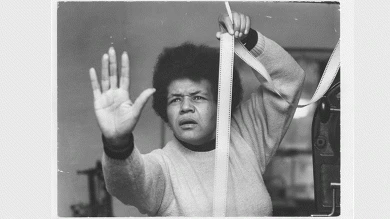
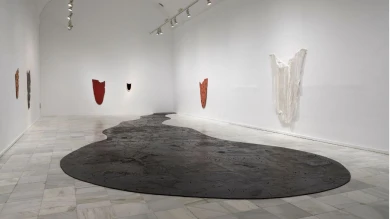
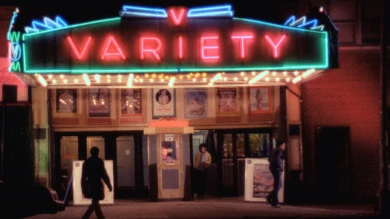
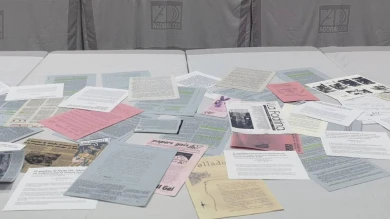
![Miguel Brieva, ilustración de la novela infantil Manuela y los Cakirukos (Reservoir Books, 2022) [izquierda] y Cibeles no conduzcas, 2023 [derecha]. Cortesía del artista](https://recursos.museoreinasofia.es/styles/small_landscape/public/Actividades/ecologias_del_deseo_utopico.jpg.webp)
![Ángel Alonso, Charbon [Carbón], 1964. Museo Reina Sofía](https://recursos.museoreinasofia.es/styles/small_landscape/public/Actividades/perspectivas_ecoambientales.jpg.webp)